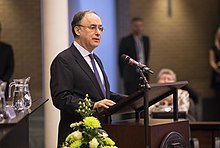Organization for the Prohibition of Chemical Weapons
| Organization for the Prohibition of Chemical Weapons OPCW |
|
|---|---|
 Logo of the OPCW |
|
 |
|
| English name | Organization for the Prohibition of Chemical Weapons |
| Seat of the organs |
|
| Chair | General Manager Fernando Arias since 2018 Spain |
| Member States | 193 |
| Official and working languages | |
| founding |
April 29, 1997 |
| www.opcw.org | |
The Organization for the Prohibition of Chemical Weapons ( english Organization for the Prohibition of Chemical Weapons , OPCW ) is an independent international organization established by the States Parties to the Chemical Weapons Convention was founded. It monitors compliance with and implementation of this convention and defines the framework conditions for the destruction of chemical weapons.
organization
The member states of the Chemical Weapons Convention are members of the OPCW. It has its seat in The Hague / Netherlands and has the following organs: the Conference of the Contracting States, the Executive Council and the Technical Secretariat (Art. VIII lit. B, C and D of the Chemical Weapons Convention). It has special contractual relations with the United Nations .
The OPCW is headed by a Director General, who is appointed by the Conference of the Contracting States (Art. VIII Paragraph 21 lit. d of the Chemical Weapons Convention). Since July 25, 2018, this has been the Spanish diplomat HE Mr Fernando Arias. His predecessors were the Turkish diplomat Ahmet Üzümcü (since July 25, 2010), the Argentine Rogelio Pfirter (since July 25, 2002) and the Brazilian José Maurício Bustani (since May 13, 1997).
As specified in the provisions of the Chemical Weapons Convention, the OPCW began its work on April 29, 1997, 180 days after the ratification of 65 signatory states (Art. XXI of the Chemical Weapons Convention). On that day, the ban also came into force in the Federal Republic of Germany. With the accession of Palestine , which came into force on June 16, 2018, 193 states belong to the organization. Only four countries have not signed or ratified the Chemical Weapons Convention : Egypt , Israel , North Korea and South Sudan .
Obligations of the contracting states
The contracting states are obliged to submit annual reports on the measures taken to implement the convention. As a link to the OPCW, all contracting states must designate an information authority. In Germany the Foreign Office assumes this function, in Austria it is the Federal Ministry of Economics and Labor . The permanent representative of the Federal Republic of Germany at the OPCW from 2014 to 2017 was Christoph Israng ; his successor is Christine Weil .
Working method
The Executive Board consists of independent inspectors who are authorized to make unannounced visits to military facilities, civil industrial plants and laboratories and who oversee the destruction of chemical weapons . In Germany, industrial controls are carried out by the Federal Office of Economics and Export Control . The organization also maintains extensive databases on chemical warfare agents and their defense, and advises states on protective measures for people and the environment. Twenty trusted laboratories are commissioned to carry out analyzes. All laboratories have to prove themselves in annual tests.
financing
The organization is financed by membership fees that are based on the United Nations' usual distribution formula. This makes the USA the largest donor with 22%. Japan follows with around 19.5% and Germany with around 10%. The total annual budget is around 60 million euros.
The official news portal "Global Affairs Canada" announced on June 29, 2017 on behalf of the State Department in Ottawa , Ontario: Canada is providing the organization with an out-of-budget CAN $ 2.5 million, equivalent to US $ 1.9 million, to disposal. According to Foreign Minister Chrystia Freeland , the sum will help the organization increase its investigative capacities in Syria. It is about the poison gas attack on Khan Shaykhun on April 4, 2017, which numerous countries attributed to the Bashar al-Assad regime and which the US government responded to with a targeted air strike . Also on June 29, the OPCW testified that at least one of the combatants had used sarin in April . The additional Canadian amount is intended to clarify the perpetrators of the attack and ensure that the Syrian government has actually destroyed all military poison gas stocks in accordance with the contract. Canada wants to take the lead in ensuring that the use of poison gas in Syria finally ends.
Nobel Peace Prize
On October 11, 2013, the organization was awarded the Nobel Peace Prize. It was ceremoniously awarded on December 10th (the anniversary of Alfred Nobel's death ) in the Norwegian capital, Oslo .
See also
Web links
- OPCW - Homepage (English)
- Contract text (translated into German)
- Art. VIII of the Chemical Weapons Convention, which regulates the structure and operation of the OPCW. (English)
- Reference laboratory Spiez
- German industrial controls
- Permanent representation of the Federal Republic of Germany at the OPCW
Individual evidence
- ↑ https://www.opcw.org/media-centre/news/2018/07/ambassador-fernando-arias-assumes-office-opcw-director-general, accessed on July 7, 2019
- ↑ OPCW at a glance. OPCW, accessed October 16, 2013 .
- ^ Contracting states to the Chemical Weapons Convention: OPCW Member States , accessed on October 12, 2013.
- ^ Agreement on Relations between the United Nations and the OPCW: Agreement concerning the relationship between the UN and the OPCW , accessed April 7, 2018.
- ^ Evolution of the status of participation in the Convention. OPCW, accessed September 25, 2018 .
- ↑ http://www.mdr.de/nachrichten/politik/ausland/syrien-chan-scheichun-giftgas-chemiewaffen-100.html
- ↑ Le Canada annonce un soutien supplémentaire pour l'interdiction des armes chimiques en Syrie , Affaires mondiales Canada, June 29, 2017
- ^ Nobelprize.org: The Nobel Peace Prize 2013 , accessed October 11, 2013.
- ↑ Chemical weapons inspectors receive Nobel Peace Prize , Süddeutsche.de, October 11, 2013.

